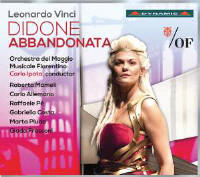Texte paru dans: / Appeared in: |
|
|
Outil de traduction ~ (Très approximatif) |
|
|
Reviewer: Ralph
Locke
This is the third Leonardo Vinci opera to
have been reviewed here in recent years.
Charles H Parsons greatly
enjoyed videos of Partenope (J/F 2014) and Artaserse (S/O 2014), the latter
starring the magnificent countertenor Philippe Jaroussky. I can add my own
enthusiastic voice to Mr Parsons, now that I have listened to the world
premiere recording of Didone Abbandonata. Vinci’s opera is based on a
libretto by Pietro Metastasio that was set by dozens of other composers over
the course of more than a century, including such notables as (in
chronological order) Domenico Scarlatti, Albinoni, Galuppi, Hasse, Jommelli,
and Paisiello. The libretto was Metastasio’s very first, written for the
prolific opera composer Domenico Sarro in 1724. Two years later, Vinci set a
version that was adapted for his purposes and for the singers in question by
Metastasio himself. The first production of Vinci’s opera took place in
Rome. The women’s roles were sung by castratos because Church officials did
not permit women to sing or act on the public stage. Didone Abbandonata is
based on episodes from Ovid and Virgil. The basic plot is Aeneas’s anguished
decision to leave Dido and, at the gods’ behest, found a new city and empire
on (Didone). Mameli’s quick, tight vibrato nicely suggests Dido’s
specialness, and also the power that she wields in Carthage. When Aeneas
tells her, near the end of Act 1, that he is leaving her to found Rome,
Mameli berates him impressively, yet without ever resorting to rant and
noise. Raffaele Pé, the recording’s sole countertenor (as the African king),
matches Mameli in vocal skill and sensitive wordpointing, and he embellishes
with great flair. I also enjoyed the rich-toned mezzo-soprano Marta Pluda in
the role of Jarba’s confidant, Araspe. Carlo Allemano’s confident tenor
conveys well Aeneas’s commanding personality and deep sense of duty to his
gods-ordained mission. The small orchestra, under Carlo Ipata, plays
skillfully and with varied pacing that never drags. Good, clear booklet
essay and plot summary, though lacking details about the version heard here,
“revised” by the conductor. The track list mentions only the first character
who sings in each track. The libretto, in Italian and good English, can be
downloaded. The list of characters seems to have been drawn from the
original printed libretto. It could have been expanded a bit to make clear
that Osmida and Araspe, the advisors of Dido and Jarba, are males. Neither
name is obviously male. A few photos from the stage production helped me to
imagine the action. The costumes, fortunately, were ancient-style (if
somewhat stylized—indeed beautifully so). The singing and playing are
captured with gratifying clarity (aside from a weird echo at the beginning
of disc 3, track 7), and some sounds of stage action (e.g., sword-fighting)
help one sense what is going on. The editors have preserved a small amount
of applause yet managed to avoid distracting audience noise elsewhere. A
video has also been released. In short, this recording suggests that the
Maggio Musicale in Florence is maintaining the high standards for which it
has long been known, and extending them to unusual early repertory. It also
indicates that Vinci, heretofore mostly a name in history books, is a
composer whose operas should be staged more often. With singers like Roberta
Mameli, Vinci’s long-forgotten works are in marvelous hands. | |
|
|
|
|
Cliquez l'un ou l'autre
bouton pour découvrir bien d'autres critiques de CD |
|




